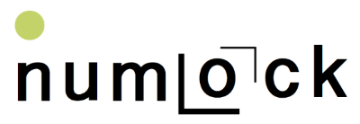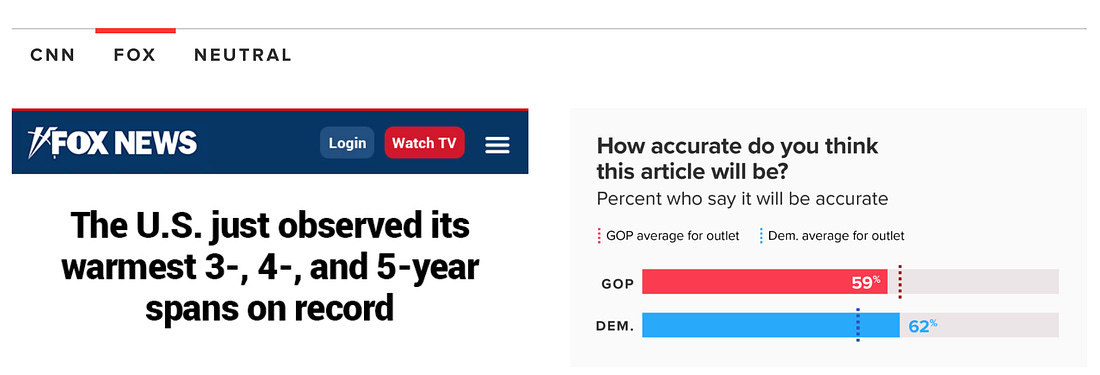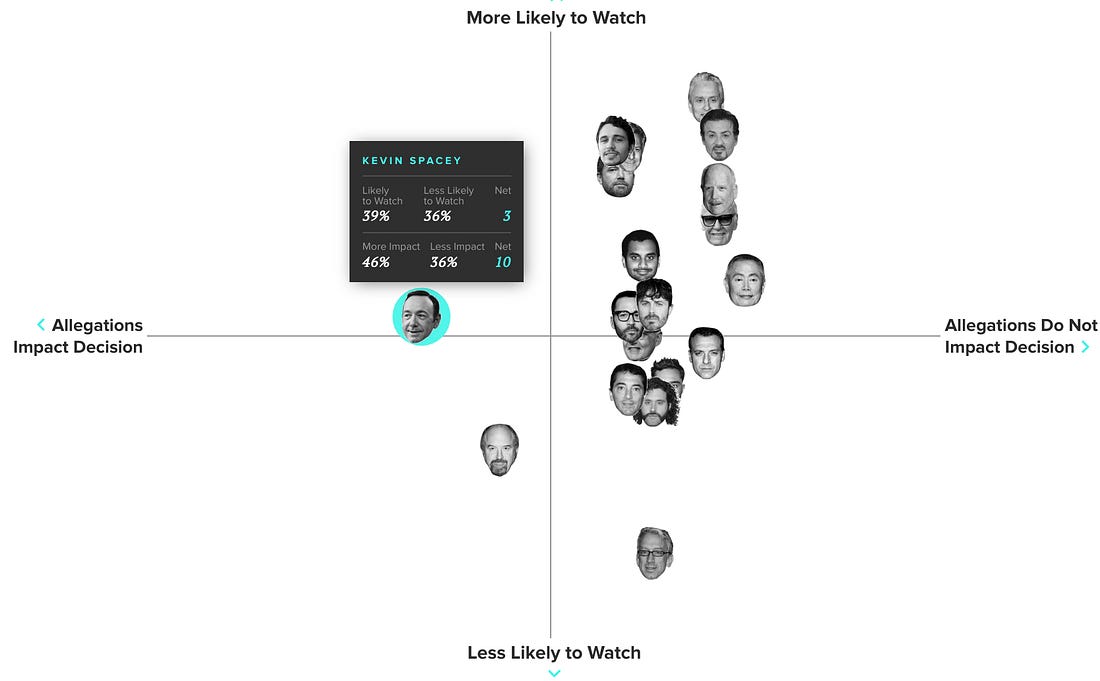Numlock Sunday: September 9, 2018
 By Walt Hickey
By Walt Hickey
Welcome to the Numlock Sunday edition. Each week, I'll sit down with a writer behind one of the stories covered in a previous weekday edition for a casual conversation about the story they wrote.
This week, I spoke to Joanna Piacenza, a senior reporter for Morning Consult, whose work has appeared in Numlock multiple times and will continue to be a staple because she is rad. Most recently, she did a study about how people’s understanding of news changes depending on who publishes it. Here's what I wrote about it:
In what is probably my favorite survey design in quite some time, Morning Consult asked readers to estimate the accuracy of a number of articles based on the headline. The brilliant move, though, was that they put those generic headlines under totally different mastheads, essentially figuring out how much people trusted, say, an article called “Number of jobs growing, June report shows” when it’s published on a generic site, when it’s published on CNN, and when it’s published on Fox News. Generally, Democrats trusted neutral sites (60 percent perceived accuracy) and CNN (63 percent perceived accuracy) more than Fox (52 percent), and Republicans trusted Fox News (62 percent) more than both neutral site (53 percent) and CNN (48 percent).
I mean, why I love this piece speaks for itself, it’s an immensely clever survey design that gets at a fairly fundamental set of divides in the U.S. right now. We spoke all about the work that went into this research, we talked about some of her other recent hits and more generally about how it’s somewhat perilous to be a brand right now.
Joanna can be found at Morning Consult and on Twitter.
This interview has been condensed and edited.
Walt Hickey: Can you tell me why you wanted to research this piece?
Joanna Piacenza: We knew that media bubbles existed. We knew that Republicans were more likely to trust Fox, we knew that Democrats were more likely to trust CNN. That was something we knew based on old surveys, based on other people's surveys. What we wanted to figure out was how that shifted by topic.
We wanted to see if a divisive topic like immigration, like climate change, like perceived chaos within the White House, if those things had some sort of impact on whether or not readers trusted an article knowing it came from a specific network.
We took a headline -- take "June Jobs Report Shows Growth" -- headlines that were correct and inspired by past headlines we had seen. We tweaked them a bit to make sure we weren't copying any headlines directly, and then we took that headline and put it under a Fox News logo headline, and we put it under a CNN logo and aesthetic, so it looked like you were reading that article on CNN or Fox. Then our creative team created a kind of a neutral outlet, and put it under there too.
And then we asked readers a couple questions: would you read this article? Would you share it with family and friends? Do you think it would be fair? Do you think it would be accurate?
My favorite was the unemployment one, because that is literally a political Rorschach test when you put it under different mastheads.
Yes! Absolutely.
The climate change one was especially revealing. The climate change headline said that the U.S. has observed its warmest three, four, and five year spans on record. When that was reported by Fox -- which based on its past reports has not treated climate change in a way many experts would say is balanced -- Democrats were more likely to trust it, based on their average perception of the accuracy of Fox News headlines overall.
Essentially, said in a nugget: confirmation bias at times trumps media bias, both for Republicans and Democrats.
That's wild. What surprised you most reporting this?
What was the most interesting, frustrating, but revealing thing about us, as people who consume news, is there isn't a one-for-one pattern. It's complicated. We as readers sometimes just want to believe something because it comes from a news outlet we trust, sometimes we just want to believe it because it's a topic we follow closely, sometimes we just want to believe it because it confirms our own biases. But it's messy! It's never straightforward. How we consume news is never straightforward.
One of the other more interesting takeaways: we asked folks whether they considered the national news media conservative, whether they considered it liberal, or non-partisan, and overall people were more than twice as likely to consider national news liberal (46 percent) than conservative (20 percent), that includes a plurality (35 percent) of Democrats. So more than a third of Democrats thought that the national news was liberal, which was an interesting takeaway.
You have an extremely cool job. You come up with cool questions and then you get to ask thousands of people about them.
I cover the business beat from a data point of view, and what's interesting to me is nowadays people expect a lot more out of brands. And that includes news brands, which is what this was about. But people expect their brands to act like people, and I think part of that is because of the elevation of social media, you interact with brands in similar ways that you interact with your friends on Twitter and Facebook and Instagram. It's a little bit more intimate, or at the very least more similar to the ways you connct with the people you know and love.
So we expect brands to have personalities, to have stances on things, to at times take up a position on a political or social issue. That can be really dangerous for a brand. That's the thing that really interests me. This article was specifically about social, political news and brands, but the the things that interest me the most are how businesses are dealing with an increasingly tumultuous time to be in the spotlight.
That being said, news changes so quickly that I can remember a dozen brand controversies off the top of head that happened in the past two months, and I'm probably missing a few dozen of them.
The way you cover stuff is super clever. I loved the story you did about the perception of how many calories were in foods, and how that expectation differed from the reality. But I also love how you covered #MeToo, I felt like you were one of the best and earliest people to dive in on the broader impact.
I'm happy to talk about that, that's one of my favorite stories. We wanted to see what these #MeToo allegations were actually doing to the actors who were facing them. A lot of producers and studios-- as soon as these allegations came to light -- would distance themselves from the actor out of fear that the person could no longer bring in money.
We wanted to figure out if that was true, if people would see a film or T.V. show starring any one of twenty actors facing allegations. That's everyone from Danny Masterson to Stan Lee -- who was actually facing allegations -- to Kevin Spacey to Louis C.K., who just recently had his first stand-up since those allegations. We asked what is the appeal of these people and whether or not people would see entertainment from these actors.
Later on in the survey, we told them, well these people are facing allegations and have you heard of it? Interestingly enough, a majority of people had not heard about allegations for nineteen of the twenty people. News of Kevin Spacey's allegations is the only thing that penetrated and stuck in Americans' minds
Then later on we asked, knowing that they are facing allegations, does that impact your decision to watch their work? Of the 20 actors, for 18, viewers said no, there would be no sort of impact. There were only two, Kevin Spacey and Louis C.K., where we see any sort of substantial negative impact over whether viewers would see their work.
Was there a difference between men and women?
There was, men tended to be a little easier on the men and women a bit harsher. We also looked at frequent television viewers and frequent moviegoers. Strangely, television viewers were a lot more relaxed in their criticism and frequent moviegoers could be a lot more harsh. Some of that could be attributed to socioeconomic status—people who regularly see films tend to be a bit wealthier, a bit more liberal, and overall more supportive of the #MeToo movement.
I mean, 20 percent of the American box office market is in New York and L.A. Any last takeaways?
Data and polling analysis like this helps people understand places they don't really know. I did a piece on Fortnite, I knew very little about video games before I started, now I would consider myself something of a mobile video game expert.
A lot of that is because of data, it's a condensed, beautiful way to look at an industry that you're just starting to explore.
Did you ever win Fortnite?
So, the first time I played? I got fourth.
You're a natural!
It was mostly because I hid. I am very good at hiding. Please don't put that in there.
Of course.
You can find more from Joanna here and here. If you have anything you’d like to see in this Sunday special, shoot me an email. Comment below! Thanks for reading, and thanks so much for supporting Numlock.
Thank you so much for becoming a paid subscriber!
Send links to me on Twitter at @WaltHickey or email me with numbers, tips, or feedback at walt@numlock.news.









